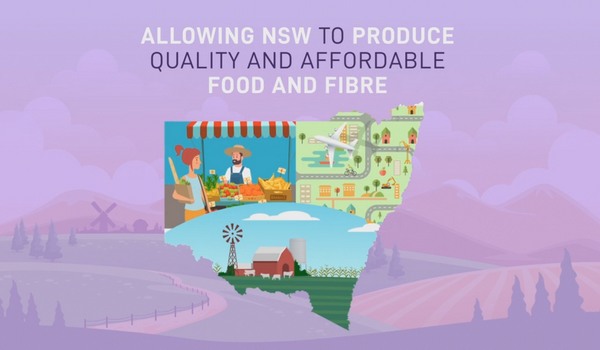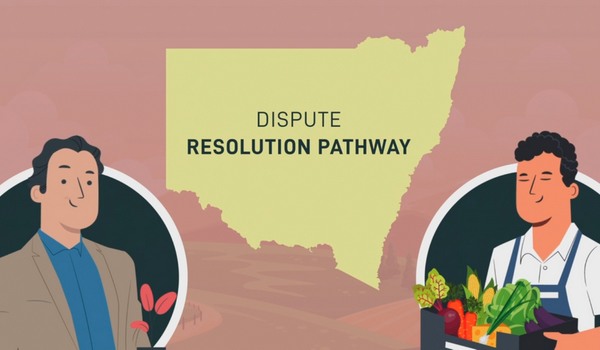The New South Wales Agriculture Commissioner is seeking feedback from farmers and horticulture industry members, after releasing an options paper to improve planning outcomes and recommending the development of an Agricultural Land Use Planning Strategy (ALUP Strategy).
In a video released by the Department of Primary Industries (DPI), it states that: "retaining productive agricultural land is vital to supporting this ($100billion value by 2030) growth. But NSW does not have a policy that identifies the best agricultural land and guides its development."
In the options paper, the Commissioner identified that agriculture generally requires larger tracts of land and access to a variety of natural resources such as good soils and water, as well as access to markets, infrastructure and labour - and that planning outcomes can significantly impact land values and effect opportunities for agricultural expansion.

Image source: DPI Video (Filmotion Productions)
In addition, it found that councils and the NSW Government do not always adequately consider agriculture, and the impacts of non-agricultural development on agriculture, and without a state policy on agricultural land, councils can find it difficult to prioritise agriculture in the rural zone. There can also be no monitoring of the loss of productive agricultural land to understand the cumulative impacts of individual developments.
"This means that agriculture is often squeezed between other land uses or pushed further away from urban centres," the DPI video said. "Good land use planning for agriculture can create opportunities for growth, allowing NSW the opportunity to produce quality and affordable food and fibre, and supporting regional communities."
The Commissioner is seeking feedback on these options, specifically what defines the best agricultural land, whether the land should be mapped, should a state policy be used as guidance or mandatory to apply. Also, what should decision-makers be forced to consider before allowing non-agricultural development on agricultural land.
Another issue considered in the options paper was: 'reducing land use conflict and supporting dispute resolution'. The paper identified that land use conflict can involve existing agricultural processes or new and expanding operations, and can cause delays in development approvals and impose more costs on farmers to defend standard agricultural activities. The Commissioner says that the ALUP Strategy could develop a simple, accessible and fair dispute resolution pathway that can support farmers and regional communities positively manage disputes about farming practices.
"Land use conflict is currently resolved through councils, but can sometimes escalate into litigation," the DPI video said. "This conflict can stop farmers operating in the way that they need to, be costly if they need to change practices to appease complainants, and can cause a great deal of stress. As urban centres sprawl to accommodate growing populations, residential activities will continue to encroach in rural areas, increasing the risk of land use conflict. There is no standard process to resolve disputes and no clarity around what an accepted farming practice is, leaving a farmer to defend their operations."

Image source: DPI Video (Filmotion Productions)
The third and final issue considered in the options paper was the support the growth of agriculture and regional economies, following the 'perception among stakeholders' that the planning framework does not reflect the needs of agriculture and operations and investment in agribusiness in NSW.
The DPI video states: "The planning system sets out what can and can't be done with the land, so it has a strong influence on investment and agriculture, and in turn on regional jobs. The Commissioner has heard that the planning system is complex and hard to navigate; some requirements can be open to interpretation, which means businesses are treated differently depending on where in the state they are. This is confusing and causes uncertainty, which can turn off potential investment. The New South Wales Agriculture Commissioner wants to support the growth of agriculture and regional economies, and is looking for feedback on how the planning system can be streamlined to support investment."
Click here to view the options paper.
or to take the survey, click here.
To provide further feedback, email the Commissioner: agcommissioner@dpi.nsw.gov.au
Department of Primary Industries
Phone: +61 2 6391 3100

